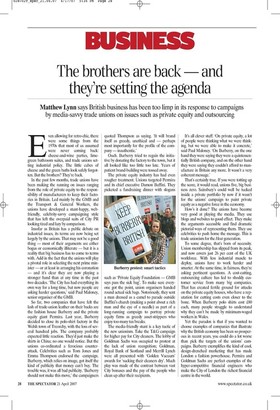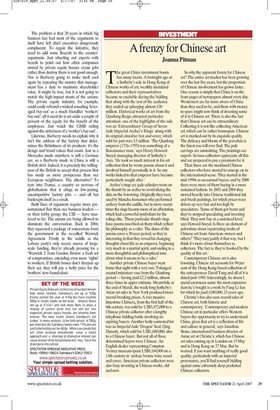The brothers are back — and they’re setting the agenda
Matthew Lynn says British business has been too limp in its response to campaigns by media-savvy trade unions on issues such as private equity and outsourcing Even allowing for retro-chic, there were some things from the 1970s that most of us assumed were never coming back: cheese-and-wine parties, limegreen bathroom suites, and trade unions setting industrial policy. The little cubes of cheese and the green baths look safely forgotten. But the brothers? They’re back.
In the past few months, trade unions have been making the running on issues ranging from the role of private equity to the responsibility of manufacturers to keep their factories in Britain. Led mainly by the GMB and the Transport & General Workers, the unions have developed a stunt-happy, webfriendly, celebrity-savvy campaigning style that has left the overpaid suits of City PR looking tired and lazy by comparison.
Insofar as Britain has a public debate on industrial issues, its terms are now being set largely by the unions. That may not be a good thing — most of their arguments are either bogus or economically illiterate — but it is a reality that big business has to come to terms with. Add in the fact that the unions will play a pivotal role in selecting the next prime minister — or at least in arranging his coronation — and it’s clear they are now playing a stronger hand than at any time in the past two decades. ‘The City has had everything its own way for a long time, but now people are asking harder questions,’ said Paul Maloney, senior organiser of the GMB.
So far, two companies that have felt the lash of trade-union leather on their backs are the fashion house Burberry and the private equity giant Permira. Last year, Burberry decided to close its polo-shirt factory in the Welsh town of Treorchy, with the loss of several hundred jobs. The company probably expected little reaction. They’d just make the shirts in China; no one would notice. But the unions co-ordinated a ferocious counterattack. Celebrities such as Tom Jones and Emma Thompson endorsed the campaign. Burberry, which relies on image, got itself the kind of publicity that money can’t buy. The trouble was, it was all bad publicity. ‘Burberry should not make this move,’ the campaigners quoted Thompson as saying. ‘It will brand itself as greedy, unethical and — perhaps most importantly for the profile of the company — inauthentic.’ Ouch. Burberry tried to regain the initiative by donating the factory to the town, but it all looked like too little too late. Years of patient brand-building were tossed away.
The private equity industry has had even rougher treatment. Unions targeted Permira and its chief executive Damon Buffini. They picketed a fundraising dinner with slogans such as ‘Private Equity Foundation — GMB says pass the sick bag’. To make sure everyone got the point, union organisers handed round actual sick bags. Notoriously, they sent a man dressed as a camel to parade outside Buffini’s church (making a point about a rich man and the eye of a needle) as part of a long-running campaign to portray private equity firms as greedy asset-strippers who enjoy too many tax breaks.
The media-friendly stunt is a key tactic of the new unionism. Take the T&G campaign for higher pay for City cleaners. The lobby of Goldman Sachs was occupied to protest at the lack of union recognition; Goldman, Royal Bank of Scotland and Merrill Lynch were all presented with ‘Golden Vacuum’ awards for ‘sucking their cleaners dry’. Much play was made of the contrast between vast City bonuses and the pay of the people who clean up after their recipients. It’s all clever stuff. ‘On private equity, a lot of people were thinking what we were thinking, but we were able to make it concrete,’ said Paul Maloney. ‘On Burberry, on the one hand they were saying they were a quintessentially British company, and on the other hand they were saying they couldn’t afford to manufacture in Britain any more. It wasn’t a very coherent message.’ That’s certainly true. If you were totting up the score, it would read, unions five, big business zero. Sainsbury’s could well be tucked inside a private portfolio by now if it wasn’t for the unions’ campaign to paint private equity as a negative force in the economy.
How’s it done? The unions have become very good at playing the media. They use blogs and websites to good effect. They make the arguments accessible and find dramatic pictorial ways of representing them. They use celebrities to push home the message. This is trade unionism for the Heat generation.
To some degree, that’s born of necessity. Union membership has slipped from its peak, and now covers just 26 per cent of the UK workforce. With less industrial muscle to deploy, unions have to work harder and smarter. At the same time, in fairness, they’re asking pertinent questions. A cost-cutting, outsourcing culture has led to shoddy customer service from many big companies. That has created fertile ground for attacks on the private equity houses, who have a reputation for cutting costs even closer to the bone. When Burberry polo shirts cost £80 each, many people struggle to understand why they can’t be made by minimum-waged workers in Wales.
Yet the paradox is that if you wanted to choose examples of companies that illustrate why the British economy has been so prosperous in recent years, you could do a lot worse than pick the targets of the unions’ campaigns. Burberry exemplifies the kind of cool, design-drenched marketing that has made London a fashion powerhouse. Permira and Goldman Sachs are perfect examples of the hyper-competitive financial engineers who make the City of London the richest financial centre in the world. The problem is that 20 years in which big business has had most of the arguments to itself have left chief executives dangerously complacent. To regain the initiative, they need to add some flourish to the counterarguments. Just wheeling out experts with beards to point out how often companies owned by private equity houses create jobs rather than destroy them is not good enough. Nor is Burberry going to make itself cool again by repeating the mantra that management has a duty to maximise shareholder value. It might be true, but it is not going to match the high-impact stunts of the unions. The private equity industry, for example, could easily rebrand a wicked-sounding ‘leveraged buy-out’ as a much friendlier ‘workers’ buy-out’: all it need do is set aside a couple of percent of the equity for the benefit of the employees. Just watch the GMB railing against the unfairness of a ‘worker’s buy-out’.
Likewise, Burberry needs to explain why it isn’t the address of the factory that determines the Britishness of its products: it’s the design and brand values that count. Just as a Mercedes made anywhere is still a German car, so a Burberry made in China is still a British shirt. Indeed, it is precisely the willingness of the British to accept that process that has made us more prosperous than our European neighbours. The alternative? To turn into France, a country so nervous of globalisation that it clings to low-paying, uncompetitive factory jobs — and all but bankrupts itself as a result.
Both lines of argument require more presentational flair than our business leaders or their lobby group, the CBI — have mustered so far. The unions are being allowed to dominate the conversation. Back in 2004, they squeezed a package of concessions from the government in the so-called Warwick Agreement. Firmly in the saddle as the Labour party’s only secure source of largescale funding, they’re already pressing for a ‘Warwick 2’ from Gordon Brown: a fresh set of compromises, extending even more ‘rights’ to workers. If British bosses don’t sharpen up their act, they will pay a hefty price for the brothers’ new-found clout.



















































































 Previous page
Previous page